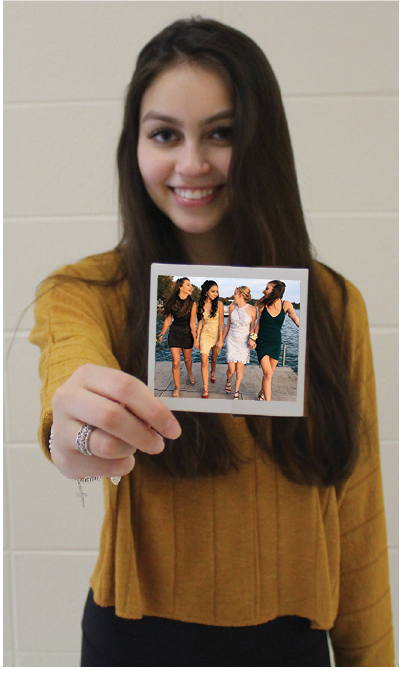#WeWereLZ
Students past actions shape their future
As seniors leave for colleges across the country, students are looking back on what got them where they are now.
There are those negative experiences: painful at the time, but the struggle can turn into success that matters much more than any temporary hardship. The immediate outcome of a negative experience depends on the person, Leslie Thomas, guidance counselor says. Some people will be able to come out of a bad experience without much trauma, but others will struggle much more, the counselor says.
“There are people who have the ability to go through negative things and are able to process quickly and see the light on the other side. [They are able to] cope really easily, put it in the rearview mirror, and move on with life,” Thomas said. “Then I think there’s a set of people that don’t ever get past those negative experiences, and it really has an impact on their life.”
Although the negative experience will always be initially painful at different levels, Thomas says that positive outcomes will be a long-lasting result. According to the counselor, anyone who undergoes a painful experience will learn a lot about themselves.
“You really get a sense of how strong you are as a person, and how you deal with [the negative experience]. A strong person will go to therapy, or talk to people and get the help they need,” Thomas said. “[You also learn] who your friends are, and who you can really count on for support.”
While negative experiences shape people, so do the sacrifices people make. People often have to get rid of something they want to or something they are used to for a better future for themselves.
“Young people are under so much pressure to excel that they’re sacrificing vital life skills, experiences, healthy relationships, and even their own happiness,” according to an intergenerational study from the National Citizen Service (NCS) from the UK. “76 percent of 15 to 17-year-olds will cut out friendships, family time, hobbies, and even sleep to achieve [success in the future].”
Negativity shaping Positivity:
Whether it be a teacher or a student, nearly everyone can relate to going through a painful experience.
These experiences can shape people in different ways, and impact how you act in the future, students who have undergone negative experiences say. One of those students, Yusra Zakria, senior, says that her experiences in middle school have empowered her to work harder for her career.
Zakria went through significant torment from her peers, because “they felt threatened by me since I was the same academic level as them even though I was a full year younger.” According to Zakria, her peers would “bully me with verbal abuse”, including various slurs and rude comments. These comments hurt in particular because she “thought they were my close friends, and then it was those very people who turned on me. I had trusted them so much, and that’s what really impacted me the hardest.”
That impact caused her to lose confidence and hurt her in the short term, Zakria says. However, with the help of her parents and teachers, Zakria says, she gained the values which allowed her to thrive later on.
“I wasn’t able to focus because behind me I would hear people making comments about me, and swearing at me. So that’s what affected me performance wise and made my grades dip lower temporarily,” Zakria said. “In the long run, I think the values [my supporters] instilled in me: that I matter, that my opinions matter, that I am intelligent, I think those are the things that are really going to drive me further in my career.”
Negative experiences will not always drive careers, but can impact how you act, Jennifer Ventrelle, math teacher, says. According to Ventrelle, she learned early on how treating people with disrespect can be traumatizing.
“I was in like third or fourth grade, and I was a very small person. There was this boy in my class who was very large, like tall, just big, I mean it was hard to think that we were the same age. We had like a hot lunch day or something, and we were waiting in line in the classroom,” Ventrelle said. “I can remember this like it was yesterday, he picked me up and threw me in a garbage can in our classroom. He just came and popped me in the garbage can, there was no reason behind it whatsoever, I just got thrown in the garbage can.”
While the experience was shocking at first, Ventrelle says that being treated with such disrespect made her more compassionate in the long-run. As a result of the incident, she understands more of what others are going through, and is able to show empathy, Ventrelle says.
“[Negative experiences] do shape your thoughts and future actions, and the way you treat people, because if you’ve been through some bad things so you can have a little bit of empathy for people,” Ventrelle said. “You always see those kids in class who are maybe a little more shy, or don’t have as many friends, in that class at least. So you try to be a little more sensitive, I just feel like I know what they are going through and try to be a little more sensitive.”
Negative experiences will impact people in different ways, Thomas says, but they are crucial for living a healthy and fulfilling life. According to Thomas, going through negative experiences is important for every high-schooler to prepare them for life outside of high school.
“As soon as you leave our doors and you graduate, life is going to happen and it’s going to hit you in the face. Most of our kids go to college, where they face a whole host of adversity, and you need to know how to deal with that,” Thomas said. “You need to know how to pick yourself up and dust yourself off if you run into x, y, or z situation. If you have never had to do that before, you’re going to have a really hard time with it the first time it happens. Life in general is nothing but one big problem to solve after another.”
Making Sacrifices:
Being an adolescent comes with the burden of making critical choices and sacrifices. The fear of the future often drives student’s to make sacrifices which often times can result in positive outcomes.
Especially in this day and age, with constant pressure to get into a good college or to get a good job, students are forced to make sacrifices which they otherwise would not have, according to Aralia Pawlick, senior.
“[A sacrifice I have made] is not joining as many clubs and sports as I could have due to my homework load. I haven’t spent as much time with my friends for the same reason,” Pawlick said. “Because I’ve placed school obligations over most others, I’ve been less involved outside of school than I otherwise could have been.”
She discounts her success, however, to some of the sacrifices she has made throughout her time in high school. Her hard work helped her on her path to success, she says.
“More specifically, I’ve gotten some scholarship offers for my grades, which is gratifying,” Pawlick said.
Chloe Faris, January 2019 graduate, also had to make numerous sacrifices, including her entire second semester of high school. Doing so required a lot of willpower, Faris said.
“I had to be responsible as a student, so I took classes over the summer but my senior year wasn’t that difficult since I got classes [like consumers education and government] out of the way,” Faris said. “I really like to challenge myself and get ahead so I feel like [graduating early] was good for me.”
There are positives and negatives to sacrificing second semester of senior year, but the positives weigh out the negatives, according to Faris.
“[Some things I’ve had to sacrifice were] things like the senior prank and senior ditch day, but I still get to walk at graduation,” Faris said. “Graduating early allowed me a lot more time to take [classes at] CLC and work. I can make money while taking classes that will go to my college credit.”
Like Pawlick and Faris, according to a Bear Facts survey, 90% of students have made sacrifices which have helped them on their path to success. However making sacrifices does not guarantee success, according to Pawlick.
“[Making sacrifices] were not successful in helping me get into [getting into] my dream school and other [instances like those],” Pawlick said. “But I am happy with how I have spent my time at high school.”

As a senior, this is Sreelikhi's third year on staff and second year as the Spotlight Editor. She is a member of the Varsity Tennis team, a member of the...

As a senior, this is Max’s third year on staff and first year as magazine editor in chief for the Bear Facts program. He aspires to study environmental...

